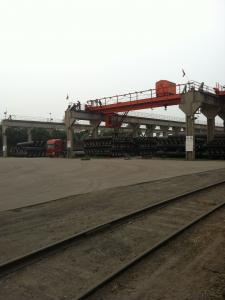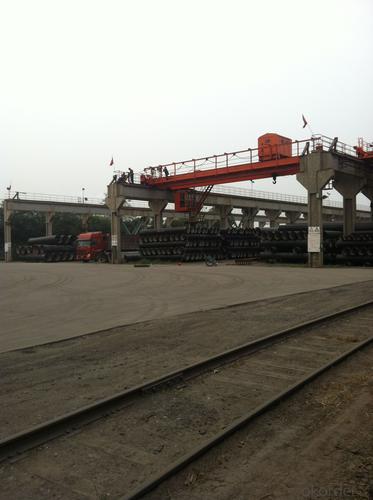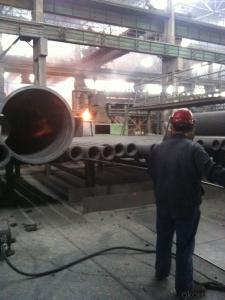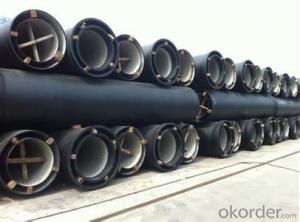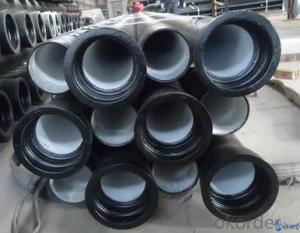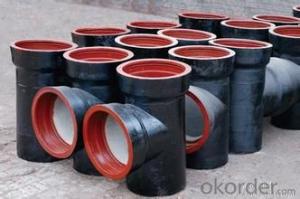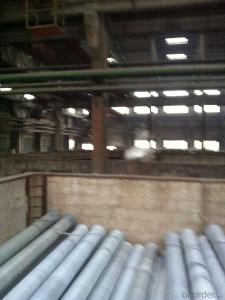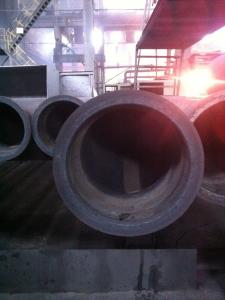DUCTILE IRON PIPES AND PIPE FITTINGS K9 CLASS DN1100
- Loading Port:
- Tianjin
- Payment Terms:
- TT OR LC
- Min Order Qty:
- 22 pc
- Supply Capability:
- 3000 pc/month
OKorder Service Pledge
OKorder Financial Service
You Might Also Like
Material : Ductile Cast Iron
Size Range : DN 80mm to DN 2000mm
Unit Effective Length : 6m or 5.7m
Manufacture Standard: ISO 2531:1998/ EN 545:2006/EN 598:2007
Annual capacity : 200,000 tons
Coating Exterior: Zinc 130g/m2 according to ISO 8179-1 and bitumen coating 70 microns.
Cement Interior: Portland Cement/ High Alumina Cement/ Sulphate Resisting Cement Lining according to ISO 4179
Special requirements on external coating and internal lining can be applied
We also provide accessories such as SBR/EPDM rubber gaskets, lubricant paste, pipe caps, PE sleeves, etc.
Additional Parts:
Each pipe is strictly inspected according to related standard to ensure permanently high performance.
Easy Installation at site and service free for life
Long Service Lifespan
Quotation will arrive you within 24hours once we get your inquiry.
We guarantee offering you a competitive price.
A copy of original inspection reports of pipes will be offered after shipment.
Photos of loading process will be sent to the customer after shipment effect.
We will follow-up the delivery progress after shipment effect and update to the customer on weekly basis.
- Q: What are the common pressure ratings for ductile iron pipes?
- The pressure ratings for ductile iron pipes can vary depending on the application and industry standards. However, the most commonly used pressure ratings are Class 150, Class 200, Class 250, and Class 350. For low-pressure applications, Class 150 ductile iron pipes are typically used. These pipes have a working pressure of up to 150 psi and are commonly used for water distribution systems, irrigation, and gravity flow sewer systems. For applications requiring slightly higher pressure, such as industrial water supply and fire protection systems, Class 200 ductile iron pipes are used. These pipes have a working pressure of up to 200 psi. For more demanding applications, Class 250 ductile iron pipes are suitable. These pipes have a working pressure of up to 250 psi and are used for high-pressure water supply systems, power plants, and municipal water distribution networks. For heavy-duty applications, such as industrial water supply and oil and gas pipelines, Class 350 ductile iron pipes are used. These pipes have the highest working pressure rating, with a maximum pressure of up to 350 psi. It is important to note that these pressure ratings are general guidelines and can vary depending on the manufacturer and product specifications. Consulting industry standards and guidelines, as well as working with qualified engineers and professionals, is crucial to ensure the correct pressure rating is selected for a specific ductile iron pipe application.
- Q: How do ductile iron pipes perform in cold weather conditions?
- The exceptional performance of ductile iron pipes in cold weather conditions is well-known. Unlike cast iron or PVC, ductile iron exhibits remarkable resistance to low temperatures. This resistance is primarily attributed to its unique microstructure, which enables it to maintain its structural integrity even in extreme weather conditions. In freezing temperatures, ductile iron pipes demonstrate a low coefficient of thermal expansion, meaning they do not contract or expand significantly with changes in temperature. This characteristic ensures their stability and prevents cracking or bursting. Additionally, the high impact resistance of ductile iron further enhances its ability to withstand the stress imposed by cold weather conditions. Moreover, ductile iron pipes are equipped with a protective lining, typically composed of cement mortar or epoxy. This lining acts as an additional barrier against the effects of cold weather, preventing the formation of ice on the inner surface of the pipes. Consequently, the risk of blockages or reduced flow capacity is greatly reduced. In conclusion, ductile iron pipes are a reliable choice for cold weather conditions. Their durability, low thermal expansion, and protective lining make them highly resistant to the challenges posed by freezing temperatures. Whether used for water supply, sewer systems, or other applications, ductile iron pipes have consistently proven their effectiveness even in the harshest winter climates.
- Q: How to control mortar proportioning in ductile iron pipe cement coating
- The calculation steps are: first to calculate the amount of plastering engineering (area), and then check the "national construction basic quota" quota in the corresponding amount of mortar project, engineering quantity multiplied by the amount of mortar that fixed amount of mortar, the mortar amount multiplied by the corresponding mix ratio of mortar, the consumption of raw materials can be obtained.
- Q: Are ductile iron pipes suitable for railway crossings?
- Yes, ductile iron pipes can be suitable for railway crossings. Ductile iron is a strong and durable material that has been widely used in various applications, including water and sewage systems. Its high tensile strength and flexibility make it suitable for withstanding heavy loads and vibrations, which are common near railway crossings. Furthermore, ductile iron pipes have excellent resistance to corrosion, which is crucial in areas prone to moisture and exposure to different weather conditions. This resistance ensures the longevity of the pipes, reducing maintenance and replacement costs. Additionally, ductile iron pipes are known for their ease of installation and versatility. They can be easily connected with other types of pipes or fittings, allowing for a seamless integration into the overall railway crossing infrastructure. It is important to note that the suitability of ductile iron pipes for railway crossings also depends on various factors such as load requirements, soil conditions, and specific project specifications. Consulting with engineering professionals and adhering to industry standards and regulations is essential to ensure the appropriate selection and installation of ductile iron pipes for railway crossings.
- Q: What is the use of ductile iron?
- Manufacturer of automotive diesel engines are starting from the prolong engine life, particularly cautious about expressing selection of crankshaft material, when the isothermal bainitic ductile iron and high strength in order to increase the power to weight ratio, expand the turbocharger use influence design according to the material, equipped with exhaust turbocharger tube the temperature is increased to 500 to 70. C, in this condition, the oxidation and creep strength become important. Ductile iron, with good properties, is being used instead of gray iron for the exhaust pipe and will further use silicon aluminum alloy ductile iron as the temperature increases.
- Q: Can ductile iron pipe be used for wastewater treatment plant sludge handling?
- Indeed, ductile iron pipe is suitable for the handling of sludge in wastewater treatment plants. Possessing strength and durability, this material resists corrosion and endures the challenging conditions related to sludge management. Frequently employed in wastewater treatment plants for sludge transport, it ensures remarkable structural integrity and boasts an extended lifespan. Moreover, ductile iron pipe proves effortless to install and maintain, rendering it a pragmatic selection for sludge handling purposes within wastewater treatment plants.
- Q: Can ductile iron pipes be used for underground chemical processing systems?
- No, ductile iron pipes are not suitable for underground chemical processing systems as they can corrode and react with certain chemicals, compromising the integrity of the system.
- Q: Can ductile iron pipes be used for underground cable conduits?
- Yes, ductile iron pipes can be used for underground cable conduits. Ductile iron pipes are known for their strength, durability, and resistance to corrosion, making them suitable for various applications including underground cable conduits. They have the ability to handle heavy loads and provide protection to the cables from external elements. Additionally, ductile iron pipes have a long lifespan, reducing the need for frequent replacements and maintenance. However, it is important to consider factors such as depth of burial, soil conditions, and specific requirements of the cable installation before choosing ductile iron pipes for underground cable conduits.
- Q: What is the expected pressure class for ductile iron pipes?
- The expected pressure class for ductile iron pipes can vary depending on the specific application and the requirements of the project. However, generally speaking, ductile iron pipes are designed to handle high-pressure applications and are commonly available in pressure classes ranging from 150 psi (pounds per square inch) to 350 psi. These pressure classes indicate the maximum operating pressure that the pipe can withstand while maintaining its structural integrity. It is important to consult with industry standards and guidelines, as well as the project specifications, to determine the appropriate pressure class for ductile iron pipes in a given situation.
- Q: Are ductile iron pipes suitable for use in oil refineries?
- Yes, ductile iron pipes are suitable for use in oil refineries. They have excellent corrosion resistance and high tensile strength, making them ideal for transporting various fluids and gases in harsh environments such as oil refineries. Additionally, their flexibility and durability allow for easy installation and maintenance, ensuring reliable operations in refinery facilities.
Send your message to us
DUCTILE IRON PIPES AND PIPE FITTINGS K9 CLASS DN1100
- Loading Port:
- Tianjin
- Payment Terms:
- TT OR LC
- Min Order Qty:
- 22 pc
- Supply Capability:
- 3000 pc/month
OKorder Service Pledge
OKorder Financial Service
Similar products
Hot products
Hot Searches
Related keywords
